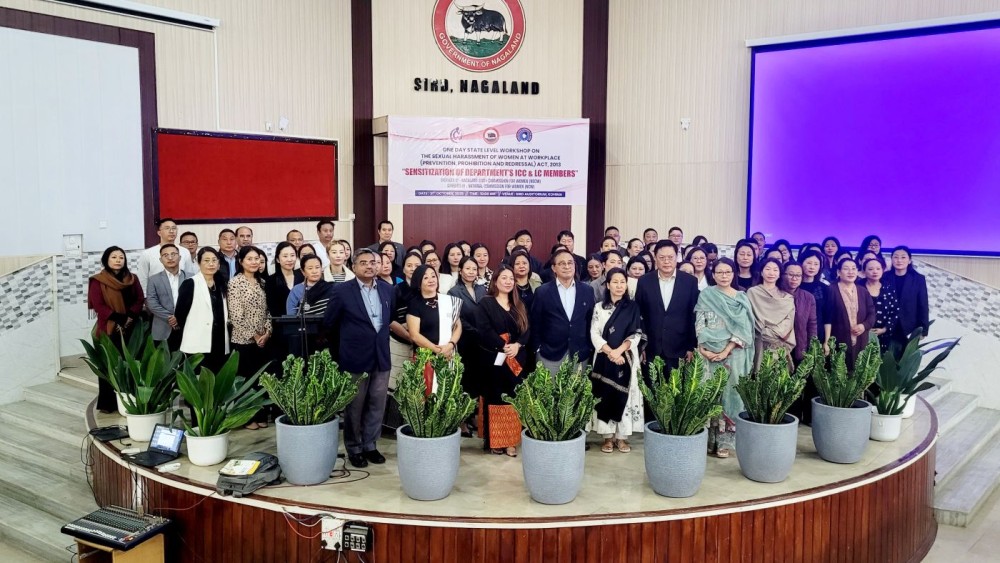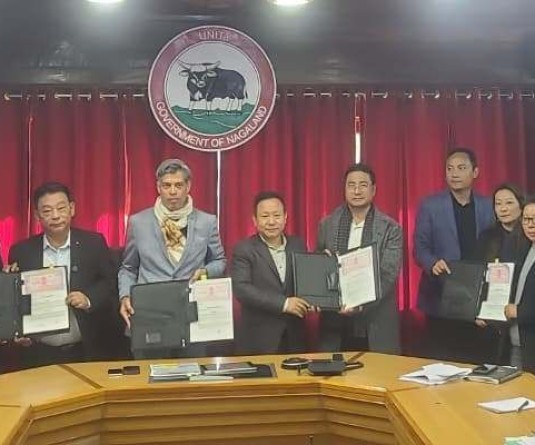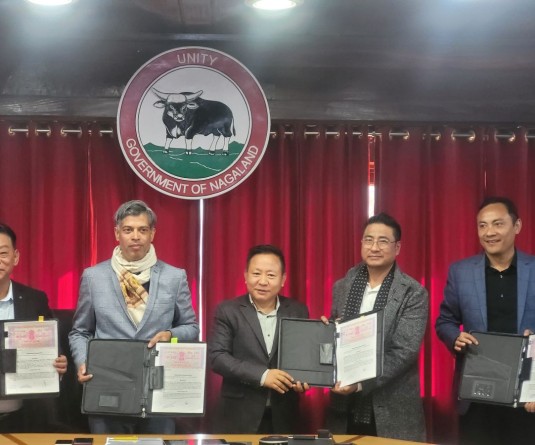Resource persons, NSCW members and participants during the one day workshop on the POSH Act 2013 at SIRD Auditorium, Kohima on October 31.

Morung Express News
Kohima | October 31
Chairperson of the Nagaland State Commission for Women (NSCW), W. Nginyeih Konyak has raised concerns over the “culture of silence” surrounding women’s safety and the persistent impact of patriarchal attitudes in Naga society.
She said that the closely knitted social structure of Nagaland and the way girls have been conditioned to remain silent victims of the “patriarchal onslaught” have led many women to suffer in silence rather than report cases of abuse or harassment.
Konyak was speaking at the one-day state level workshop on the Sexual Harassment of women at Workplace (Prevention, Prohibition and Redressal) Act 2013 with all the department’s ICC and LC members organised by the Nagaland State Commission for Women (NSCW) at SIRD Auditorium, Kohima on October 31.
Highlighting the unequal power dynamics in workplaces, she noted that hierarchical structures often put women in vulnerable positions who are often left to choose between filing a complaint or keeping their jobs as reporting harassment could cost them their livelihoods.
Calling the POSH Act a “significant step forward” in ensuring safer workplaces for women, Konyak explained that the POSH Act provides a comprehensive framework to address sexual harassment at the workplace and offers vital safeguards for victims. It also helps reduce the burden on the judiciary by ensuring timely and speedy redressal for women, giving them the confidence that justice will be served, she stated.
However, she also expressed concern referring to a Supreme Court survey, that several state government departments have either failed to establish Internal Complaints Committees (ICCs) or have done so without meeting the required composition, including the absence of external members as mandated.
To this end, she urged all Heads of Departments (HoDs) and private sector to strictly adhere to the Supreme Court’s directives stated that “a half-heartedly implemented legislation won't help women to get the equal status provided under Article 14 of the Indian constitution.”
Making a strong appeal for collective responsibility, Konyak said “Intimidation, harassment, and violence have no place in a democracy. It’s time we start conversations about changing the culture of sexual harassment and discrimination in politics, state capitals, and our larger communities to speak up and with speak out.”
Strict enforcement of POSH Act
The POSH Act, T.N. Mannen, MLA Advisor for Law Justice said, is not only a legal formality to safeguard the victims but also to ensure that employers uphold their moral responsibilities in maintaining dignity and respect at work.
Besides, he stated that every employee must be aware of the provisions of the POSH Act to ensure decency and pleasant atmosphere among co-workers.
Citing some challenges which may hinder the effectiveness of the Act, Mannen said underreporting remains one of the biggest concerns as there is fear of social stigma, retaliation and lack of awareness.
Besides, he maintained that some organisations may not comply with the Act and ICC may not function effectively. He also noted that deep-rooted ‘patriarchal attitude and power dynamics’ can hinder effective implementation.
He suggested on the pressing need to increase awareness whereby the POSH Act empowers women to speak up and seek redressal. While noting that sexual harassment is still prevalent even in civilized and cultured societies, he emphasised on the need for strict implementation of the Act, and urged women to come forward with courage.
Workplace safety requires cultural change
Stressing on the crucial need of creating safe and respectful workplaces, Limawabang amir, Secretary, Department of Social Welfare underscored that the POSH Act must be implemented not merely as a legal formality, but as a living commitment to dignity and justice for all employees.
Highlighting that the Internal Complaints Committees (ICCs), mandated under the Act, are not just mandatory structures on paper but serve as “the very backbone of the redressal mechanism, he reminded that addressing sexual harassment is not the responsibility of the ICC alone.
Emphasising that real change requires a cultural shift, not just legal compliance, Jamir asserted that “a culture of zero tolerance can only be achieved when silence is replaced with awareness and hesitation with accountability” further adding “while laws and committees form the structural backbone, culture forms the heart of real change. A truly safe workplace must grow from daily practice from mutual respect, gender sensitivity, and clarity of behaviour.”
He also asserted on the need for continued sensitisation efforts and institutionalisation adding “when organisations respond with prompt action, confidentiality and compassion, they not only ensure justice, but also build trust. Trust in systems, trust in leadership and trust in the workplace itself.”
The inaugural session was followed by the technical session with Adv. Vikram Srivastava, Advocate & Founder, Independent Thought, Adv. Apila Sangtam and K Ekla, Director, Prodigals Home, Dimapur as resource persons.
Meanwhile, citing the recent murder of a young girl at Kohima, members of NSCW has appealed to the leaders and government of the day as well as the law enforcement agencies to expedite the investigation to a logical conclusion and deliver justice at the earliest. It has also observed a moment of silence in solidarity for late Vihozhonu Zao.






